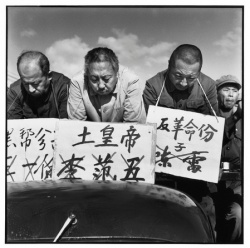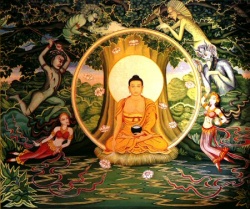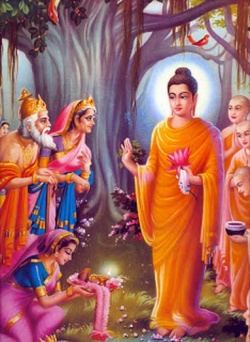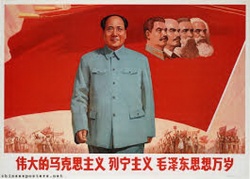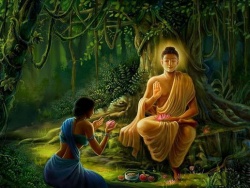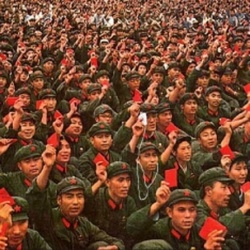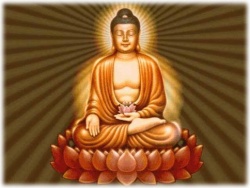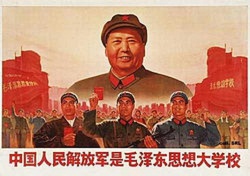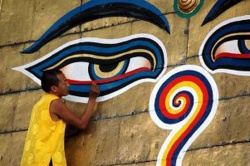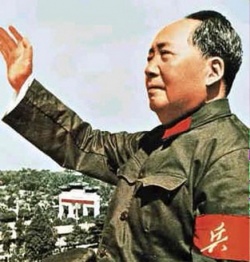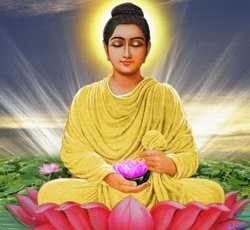A Comparative Study of Maoism and Buddhism
The Motive
When I arrived in America in December of 1972, I met many of my readers and friends who had been to my hermitage once or many times and also some new visitors. However some of them have more or less mistakes in their recognition of Maoism and Buddhism. Many Buddhist countries such as Burma, North Vietnam and North Korea have already become Communist countries. The practice of almsgiving, helping the poor, internationalism and Bodhisattvas attitudes are similar to the Communist false ideals. Some people are not able to, nor have they tried to discriminate between Buddhist philosophy and Marxism. Actually Buddhist philosophy is not even based upon psychology, much less based upon physiology as the Communist theory of Materialism. Maoism is, in fact, a group of robbers being utilized by a few ambitious persons, and the differentiations between them and Buddhists are very easy to distinguish.
Just like a snake moving inside a bamboo, the upside toward the open sky is Buddhism and the downside which falls into hell is Maoism. The American New Communist Party is quite different from Maoism, except for those who have been brainwashed by Maos bloody water! Hence a Buddhist should keep himself in the purification of Hinayana and sublimation of Mahayana according to the doctrines. Dont confuse it with Maoism!
Maoism
Along with his teachers Marx and Lenin and followers Lin Piao and Kuo Mo-Jo,
1. Established Castes
In a non-caste country Mao created castes. In China there were no castes at all, neither in ancient times nor at the beginning of this century. Confucianism (551 B.C.), which is a powerful ethic to every Chinese, gives us a most influential proverb: "All within the four seas are brothers." Mao himself was not a Proletariat nor was Lin Piao who had enough money to stay and study in Moscow, nor was Cho En Lai who was a student in Paris.
In short, among all those robbers, there was not even one proletariat. But Mao created the class of Proletariats by setting fire to all those villages which he had robbed. He wrote a book named "Analysis of the Classes in Chinese Society" in which he created the Landlord class, compressor class, middle bourgeois, semi-proletariat, and the proletariat. They are neither known to the Chinese historians nor really appeared in that society.
Mao just utilized the poor to kill the rich. He enslaved the poor farmers to work in the fields and send the full harvest into his own pockets, allowing them a little food to support their lives of a meager existence. Most classes were created by Mao himself, and neither by birth nor by society. They are changeable; a proletariat may become a rich man and a landlord a burglar. Chow En Lai was once a bourgeois and was driven out from Maos party.
Along with other religions of the heaven-and-man-yana, (Maos contradictory actions against his own memory are also mentioned on this side!)
1. Abolished Castes
In caste-countries Gautama Buddha got rid of castes. In India, every historian knows, that there were four classes or castes: viz., Brahmana (priests), Ksatriya (warriors), Vaisya (Merchants or landowners), and Sudra (laborers). Gautama Buddha was a Ksatriya but neither looked up to the Brahmana nor disregarded the Sudra.
In Sutta-Nipata, Buddha says:
- No outcast is by birth;
- No Brahman is by birth.
- By deed an outcast be;
- By deed a Brahman be!
- Who is no man-of-worth,
- and makes claim to be.
- Robber of all world is he (Mao);
- Lowest outcaste is he.
- Such are all outcastes called
- This I declare to thee.
And Buddha voluntarily took from beneath his bed a Candle, who was of the lowest caste of Sudra, to be his disciple and helped him to become an Arhat, even before Ananda, who was of the same caste as Gautama Buddha.
In the Dhammapada Sutra there is a chapter which particularly emphasizes the merits and virtues a Brahman should possess; and Buddha is called a great Brahman.
Maoism
2. Proletariat is Emphasized
Mao himself admitted that there were only two million proletariat among the Chinese population of 700 million, as is written in his booklet "Analysis of the Classes in Chinese Society," "Because China is economically backward." Actually two million is not the real number; there may be even less. Chinese industry had not yet been well developed before the rise of Mao to power. The workers had good wages and never joined his group of robbers. All the people Mao had gathered together were lazy man: robbers, thieves, pick-pockets, highwaymen, burglars, shoplifters, poachers, and small mobsters. As the so-called revolution is based upon such a class of proletariat, it has no foundation at all.
According to Marxism, Communism will develop in industrial countries but not in agricultural countries. And Lenin predicted that although Russia had begun the road to Communism first, yet England would become a real and perfect communist country before Russia due to its higher level of industry. Today neither Russia nor China nor England have become real Communist countries. Ironically, those Communist countries must purchase wheat from Canada and America to feed their people. If Canada became communist too, all communists will surely die of starvation. Obviously, the farmers under Communist leadership get little in return for their labor, and therefore do not work well!
2. Poverty is Emphasized
In Buddhism the poor men were those who did not give alms to others and had robbed rich men in their past lives. Hence, they were born into poor families or even into rich families which cannot keep their properties well and fall into a poor state. Or they are very foolish and cannot learn the skills of some art or commerce to support their livelihood. But it is very easy for them to receive religious teachings if they have good will and good motives. Confucius said, "The good man may indeed have to endure poverty, but the bad man when he is poor gives way to unbridled license," that is, becomes a robber or Communist (a Communist is a robber without shame, while a robber is a Communist with shame). In every religion all the sages were poor. It is said, "Among every ten sages almighty, there are nine Dhalum Kargyus; among every ten Dhalum Kargyus, there are nine of poverty!"
Is there in the Chinese Communist Party any proletariat poorer than the Sage Milarepa who ate only herbs and lived in a cave, and resulted in his whole body changed to a green color. But at last he became Buddha and many rich and poor men were blessed by him. Mao actually is not a proletariat and has now become very rich. He is more so than any capitalist in America, yet he is still not satisfied.
All other religions emphasize poverty. The Christian Sage St. Francis was praised by every Westerner and even by Easterners.
Maoism
3. Landlords Should be Killed
Landlords are said to always side with Imperialism. See page 1 of Maos work, "Analysis of the Classes in Chinese Society." Eventually the Imperialism of the Ching dynasty was abolished by the so called revolution of Kuomintang at which time there was no Maoism. Even in the time of Imperialism, the taxes for the land were paid by landlords and not by farmers.
This tax was only a small percentage which would be paid even in a democratic country. As the landlord were required to pay the tax, they would be allied with the farmers and not with Imperialists as Mao has said. As Mao wanted to rob all the profits for his own pockets, he had to utilize the farmers by advising them to love their nation by sending all their production to the nation, not even a grain of corn is left at home.
Prior to Maoism, the farmers sent half of their harvest at the time of the first ripening to the landlord , keeping the other half for themselves, and keeping the entire harvest of the second ripening. Now, they only get a little food; no wonder they do not work as diligently as before. Russia suffers from a similar problem. This type of communist system will never succeed.
3. Native Land to be Renounced
The practical foundation of Buddhism is renunciation. Even the hippies who emphasize dropping out have no attachment to their homeland. All the land of Taiwan was distributed to the people; the landlords were not killed, but were given money for the take over of their land. Now the landlords and farmers are both enjoying their own harvests which are never gathered into the pockets of their president.
Buddhists practice the twelve Dhuta-gunas. First, dwelling only among tombs, then living at the root of a large tree, then dwelling in the open air. Never desire to occupy more land. A very good poem is found from Tibet:
- Mind depends upon Dharma.
- Dharma depends upon poverty.
- Poverty depends upon death.
- Death depends upon solitude.
I myself lived in a cave for two years, in tombs one year, in the mountains of Kalimpong for 25 years, and I never had an inch of land, but I lived in a happy state which Mao could never dream of.
Jesus had no place to lay his head as St. Matthew said, "The foxes have holes, and the birds of the heavens have nests; but the son of man hath nowhere to lay his head."
But Mao robbed all the land of the great land of China and the price was the landlords?heads strewn everywhere! What a great pity this is! Those who shared Maos money should also share his punishment very soon.
Maoism
4. Deprived Labor Value
Labors value is much lower under Maoism than in the free world. According to the records of the international statistics list of wages, no countrys wages are as low as that of Chinese laborers. Hong Kong is geographically very close to China, but wages for a Hong Kong Laborer for one month is equal to six years of wages for the Chinese. What a large deprivation this is!
Mao always asks those laborers to love their people, but each laborer is himself people, and it seems Mao is only asking them to love Mao himself. All the surplus value of every laborer goes into his own pocket. If the definition of a Capitalist is based upon the deprivation of the labor surplus value, then Mao is the only great Capitalist in the entire world, and there are no Capitalists in the free world.
Mao speaks very beautiful and sugary words to cheat all the Chinese laborers. They all suffer with overtime work. The system of eight hours of labor, eight hours of recreation, and eight hour of sleep, has been abolished by Mao. Labor in the free world is regarded as sacred, but in the robbery of China, labor is a kind of punishment. Many people have died in Maos labor camps. Liu Shao Chionce a so-called Chairman of Chinawho had helped a lot of labor movements to create a lot of trouble for the Kuomintang, now suffers the hardships of a Mao labor camp. Those whose positions are next in line to Liu should be careful.
4. Free-will Labor
Buddhist monks?labor is based upon free-will, and the laborers of the free world have been well protected.
The Chan monasteries of China had their own rules arising from their own free will. The law in China did not require the monks to worship the Emperor, but the Emperor should worship his Guru, who is a monk. Nevertheless, the Chan monasteries always had some work to be done, a few hours to gather wood for fuel, and to plant and care for vegetables for their meals. A favorite proverb says, "The day without work is the day without food." But the time needed to work was short and the work was light, so every monk liked to do it.
In America, laborers have been protected by many organizations. Their wages are the highest in the whole world. They have labor banks to keep their money in until they can purchase shares and become so-called capitalists themselves. In America there is no set class of labor or of capitalists as Marx so easily created. In the government there is the Labor Department which contains the Bureau of Labor Statistics, the Childrens Bureau and Womens Bureau, Labor Standards, Public Contract Division, and Wage and Hour Division. Labor has been so completely protected. Abraham Lincoln declared, "The strongest bond of human sympathy outside of the family relation should be one uniting all working people of all nations and of all tongues."
Maoism
5. Contradiction
The contradictions in Maos works are not only showing up within all the above classes, but also amongst their own party. On page 316 of Maos work called "The Selected Work of Mao Tze Tung" it is written, "There is nothing which does not contain contradiction; without contradiction nothing exists." On page 317 the fact of contradiction within the party is proved, "If there were no contradiction in the party and no ideological struggles to resolve them, the partys life would come to an end." In Maos theory and Maos actions, contradictions are also found. He emphasizes the equality of all people on the one hand, but also dictatorship on the other hand. On page 39 of his small booklet of quotations, it is written, "The aim of this dictatorship is to protect all people so that they can devote themselves to peaceful labor." Before Maos dictatorship, there were many strikes amongst the laborers. But since Maos regime took power there have been no strikes. Things seem to be peaceful, but this is because strikers are now executed. One striker yields one murder, one thousand strikers yields one thousand murders. Very mathematical, but what a terrible peace it is! In Mao Country, peace means death! On the other hand, Mao emphasizes leadership. But after he lost his political leadership, he created and utilized the Red Guard through which he betrayed Liu Shao Chi ten years ago. Since then, China has had no head of state. What nation has ever been like this in the history of the world!
Besides Dhammapada verse No. 332 showing harmonization, much has been written in Confucianism: "One humane family can harmonize a whole state. But one grasping and perverse man can drive a nation to Chaos." It is also said: "Happiness, rage, grief, delight, to be unmoved by these emotions is to stand in the axis, in the center. Being moved by these passions, each in due degree, constitutes being in harmony. The axis is the center, is the great roof of the universe, and that harmony is the universes outspreading process. From this roof and in their harmony heaven and earth are established in their precise modalities, and the multitudes of all creatures persist, nourished in their meridians."
It is also written "through the principle of harmony, order is restored in the physical world. When the parents and children are affectionate toward one another, the juniors respect the elders, and this respect is extended to all people in the country."
But Mao has no faith in such doctrines. He emphasizes the contradiction between each pair of opposites. He has trained many children in each family of China to be a spy on his own family. The spy-net extends in every direction, to every corner, every cave, every village, and every family. Many parents have been killed by their own children. Lin Piao escaped at night in an airplane, but this secret information was sent by Lins own daughter to Mao and enabled the killing of her own father. Mao also doubted his own son who was sent to battle. Mao borrowed the gun of his enemy to kill his own son. What a great pity!
Maoism
6. Contradictions as Illustrated by Lenin
On page 317 of "The Selected Works of Mao Tze-Tung, Vol. 1," Mao quoted Lenins illustration of the universalness of contradictions as follows:
In mathematics: + and -, differential and integral
In mechanics: action and reaction
In physics: positive and negative electricity
In chemistry: combination and dissociation
In social science: the class struggles
On the same page he said, "Opposition and struggle between ideas of different kinds constantly occur within the party. This is a reflection within the party of contradictions between classes and between new and old society. If there were no contradiction in the party and no ideological struggles to resolve, the party life would come to an end."
Would it not be very good if the partys contradictions come to an end? In contrast, Confucius said, "The gentle man takes every group as his friend, but has no party!"
Actually Lenins examples mean only co-operation or identity. Negative depends upon positive and vice versa. A bank needs both + and -; without +, how could they total the deposits? Without -, how could they balance records after disbursements are made? Male and female organs are opposites, but compliment one another in harmony. Even in homosexuality, one partner must assume the position of female. If Mao fights with Lin Piao, the same organs fight together. What brashness!!
6. Harmonization in the Best Tantric Sense
In the social sciences, women and men are said to be of mutual aid to each other. Neither side should fight with the other. In Buddhism we read in the Hevajra Tantra, "The yogi conceives the diversity (contradiction, as Mao says) of existence as the process of emanation and realizing the dream like nature of this diversity, he renders it undiversified by means of its diversity." In yogi and yogini, their organs seem to be contradictory but the ritual of sexual intercourse brings them into harmony.
Recently we have been shown an example of harmonization through research of the biochemistry of cells. A living cell is driven to work repetitiously to acquire and anabolize adequate quantities of right quality of nutritional substances; an individual who is either predominantly male or female, is driven to seek the complimentary opposite sex. Every bisexually differentiated individual is forced to restore his internal with external equilibration, and the counterbalancing biodynamic organization of integration as a whole.
In Taoism, the contradiction is between yin and yang. In Hinduism, the contradiction is between shakti and Shakta. Both religions emphasize harmony rather than struggle.
Our new hermitage is named Adi Buddha Mandala, situated on an auspicious geomancy as the Tai (peace) hexagram. It says the receptive (earth-yin) and the creative (heaven-yang) meet and are in harmony. The result of their meeting is peace, not struggle.
Maoism
7. Mao emphasizes Struggle and War
Mao interprets the theory of contradiction as struggle between each faction of classes. Therefore, many kinds of war result and will continually occur without end. His experience yields the conclusion found on page 3 of his booklet of quotations, "Political power grows out of the barrel of a gun." This is the real truth of evil that Mao has found out. Imperialism, or Communism, both operate under the same principle of warlordism. If the warlord of capitalism should be killed, Mao the founder of warlordism should be killed first. He also emphasizes that struggle is absolute, but that unity is only conditional. In his "Selected Works," page 342, volume 1, he writes: "We say that the unity of opposites is conditional, temporary and relative, while the struggle is absolute." Again on page 334 of the same book, "Contradiction and struggle are universal and absolute." On page 344 he pointed out that struggle is ubiquitous, that means omnipresent. But in his book of quotations he says, "War should be abolished through war, and in order to get rid of the gun it is necessary to take up the gun." Which is the truth? If war is omnipresent, why get rid of it? Why is there such a truth as omnipresent war? And why did he say, "War is the continuation of politics?" Did he ever have a good motive for getting rid of war? He certainly did not! Those American Women for Peace should give their advice to Mao instead of to the American President.
7. Buddhism emphasizes Love and Peace
In Dhammapada Buddha advises Mara:
- Live and do good,
- Live holy and taste reward,
- Why do you struggle?
- Hard is struggle,
- Hard to struggle all the time!
Dhammapada also includes these thoughts:
In the Chinese Tripitaka Fo-sho-tzan-king, it is written: "Conquer your foe by force, you increase his enmity; conquer by love, you will reap no after-sorrow!"
The Dhammapada states: "Never does hatred cease by hating; hatred ceases by love!," and states further on, "Let a man overcome anger by love; let him overcome evil by good."
In Ashokas edicts it is written, "Wherein does religion consist? It consists in doing as little harm as possible, in doing good in abundance, in the practice of love, of compassion, of truthfulness and purity, in all walks of life!"
Our Maha-bodhisattva Manjusri developed twelve vows; among them, one is loving his enemy.
In Christianity, a Bulgarian proverb runs, "Where there is love, there is God." In the Bible, 1 John 4.15?God is love, and he that dwelleth in love dwelleth in God and God in him." A Spanish proverb runs, "a piece of bread with love is better than a hen with suffering." In Red China all people suffer in their doubts for one another and never get a hen.
Maoism
8. Maos Warlordisms Final Aim is to defeat America
Maos quotation pointed out that the final aim of his warlordism will be to defeat America. "The struggle against U.S. imperialism and its lackeys will assuredly win still greater victories." He also pointed out that the first World War was followed by the birth of the Soviet Union and that the second World War was followed by the birth of the Chinese Socialists. Mao wants to lead a third World War to defeat America and make the third international society successful. It is quite a dream. Actually, the last two World Wars were won only after America had joined in. Did not the German military almost occupy Moscow? If the Americans did not join the war, Moscow would have been captured. If the Japanese had not surrendered to America, how would Mao have gotten the chance to rob all over the great land of China. But Mao wanted to cover the eyes of those fools and kill those learned persons who realized what he was doing. He could kill only those in China, but not those in the rest of the world. However, he still emphasizes the fight with America. In his quotations he says, "People of the world unite and defeat the U.S. aggressors and all their running dogs."
Now Mao seems to follow the example of Khrushchevs revisionism whom he had criticized for becoming connected to the U.S., by setting up the Sino-U.S. Joint Communiqué. Yet Chou En Lais name is on this document, not Maos, for in this way Mao can repudiate the agreement and prepare the way for the killing of Chou En Lai. Sino-U.S. contact will be broken again. At present, the Central Committee members are Maos wifes running dogs. It is a starting point of preparation!!
8. Buddhism takes America as its Center
In each important generation for a certain yana there is a central country. When Buddha was alive, India was the central country for the Hinayana, the foundation of all three yanas. When Mahayana flourished in China, the center had moved from India to China. Tibet was the central country of the Vajrayana. Now America will be the center of the whole world for the whole system of Buddhism, which I alone loudly emphasize. I was sent by Buddha to come here to America, was welcomed by the great Dragon King and got the auspicious geomancy for my hermitage which is in the form of the Tai Hexagram that fits the purpose of propagating the whole system of Buddhism to the whole world for peace.
Buddha chose America as a center not because of her economic conditions, or military conditions, but for the innocent, kind, generous, and humanistic attitude of her people, on the one hand, and her naturally flourishing development of Buddhism, on the other hand. Among all my free gift addresses of the whole world, Americans occupy thirty percent. Now in America many Chan centers have been established. Many college students have become Buddhists. Many universities welcome my books and booklets even though they were written in my poor English. Though the heavy Tripitaka has no legs; they have arrived in many libraries; not only the Chinese Tripitaka, but also the Tibetan Tripitaka.
Maoism
9. Mao Insults America as Imperialistic and Instigates the Youth to Struggle Against Their Own Nation
In Maos booklet titled "People of the World, Unite and Defeat the U.S. Aggressors and All Their Lackeys," on page 8 it is written, "U.S. Imperialism is the most ferocious enemy of the people of the world." Once I took my friend who had ear trouble to a free clinic. On their wall I saw a printed announcement which said, "Unite and defeat the American Imperialism" as well as Maos whole quotation. I immediately wrote the following poem:
- Here has imperialism who say?
- Its written on the wall in May!
- Did she not fight with the real one?
- (English Imperial.)
- Such history who can deny?
- Has she an Emperor or Queen?
- Does any slave on the ground lay?
- Has she no constitution?
- Nor election in the same way?
- Didnt she let the Japanese be free?
- Become rich and no more decay?
- (Is there any Eastern European Communist Country to compare with?)
- I am an old Chinese refugee,
- As long as possible, here I would like to stay!
I put it on the wall there and asked to talk about it but received no reply. Actually Mao is the only real Imperialist for the reason that his dictatorship is anti-liberalism, emphasizes the power of the gun, is anti-every-religion, has the killing habit, and a cruel policy. All his conditions are more than enough to prove that his evil is the only Imperialism that world history has ever known.
9. Buddhist Views America as a Real Communist Country
I am a Buddhist who has found out that the U.S.A. is a real communist country without blood-shed, i.e., communism in the true sense as proposed by Karl Marx. First of all I go to the post office, university, and bank and found many black Afro-Americans and white Americans working together. On the street I see many beautiful Afro-American women arm in arm with handsome white American youths. But Maos booklet says, "19 million Afro-Americans in the U.S. have been enslaved, oppressed and discriminated against." It is quite a rumor. Mao just likes to instigate a civil war in the U.S. In China there are five different races: Chinese, Manchu, Mongol, Mohammedan and Tibetan with different languages, literatures, religions and customs, but Mao never asked them to struggle against one another. They are all under his dictatorship.
In America I have also found out that every man and woman has a smile, sense of humor, love and kindness. They all more or less have religious interest either in Christianity or in Buddhism. By lifting your thumb up to hitch-hike you can freely get a car to take you where you are going. By application you can get food stamps for your months food. By going to a certain place at a certain time every day you can get a free dinner-through the Food Project. By the time you reach 65, everyone may get social security pension to live on until they die. Old men and women as well as children are given many kinds of special treatment. Free clinics are available everywhere. The good quality of the dog food is better than that received by many Chinese people; the small quantity of cat food is still more than that received by many in China; but this is not the case in Hong Kong or Taiwan. What a comparison of Heaven and Hell!
Maoism
10. Maos Poems are of Heroism
In the work "Ten More Poems of Mao Tze-Tung" he writes:
- In heroic triumph heaven and earth have been overturned! Over Chungshan swept a storm headlong. Our mighty army (in Chinese this also means heroic), a million strong, has crossed the great river. The city, a tiger crouching, a dragon curling, outshines its ancient glories. With power to spare, we must pursue the tottering foe, and not ape Hsiang Yu the conqueror seeking idle fame. Were nature sentient, she too would pass from young to age. But in mans world seas change into Mulberry fields!
Mao is a robber, so he uses blood as his ink, a gun as his pen, a skull as his inkstone, and mans skin as his paper. Full of terrible words such as "overturned," "tottering foe," "crouching tiger", "power" and "swept"; he never makes the reader feel happy but only afraid.
A poet at least should have a heart. Mao indulges in materialism and has no heart. R. W. Gilder has written a good poem which might be good advice for Mao:
- "Give me a theme" the little poet cried:
- "And I will do my part."
- "tis not a theme you need," the world replied;
- "You need a heart!"
Mao only wants every man, woman, boy and girl to deliver their hearts to himself.
10. Buddhist Poems are of Compassion
Buddhism emphasizes non-egoism; nothing of heroism was ever created by its pen. It never kills others but only its own evils. See the following stanzas from the Dhammapada:
- Throw away anger, give up pride,
- Give up worldly desires;
- How can grief touch you,
- If nothing is your own.
- It is not by hunting creatures
- that a man becomes excellent;
- Only by non-violence,
- Is excellence achieved!
- He kills his lust and ignorance;
- He kills ambition and pride;
- He slaughters all the evils of the body,
- and the saint unaffected, proceeds as he is!
In my booklet New No. 41 on Ahimsa there are many good poems written by ancient Chinese Buddhist sages. Here I select one for your comparative study:
- Hundred and thousand years of meat soup, red and white,
- The deep ocean of hatred made by a thousand knights,
- If one wants to know the cause of war and fights,
- Listen to the slaughterhouse groans at midnight!
Maoism
11. Maos Poems are of Warlordism with Rancidity
Most of Maos poems describe war; every reader knows this. Hence a rancid smell is prevailing in his poem book. In the following example you may discover this. According to Mao, monks may be killed and flies are not to be loved:
- Only heroes can quell tigers and leopards;
- And wild beasts never daunt the brave.
- Plum blossoms welcome the whirling snow.
- Small wonder flies freeze and perish.
- Confounding humans and demons right and wrong.
- The monk was kind to foes and mean to friends;
- Endlessly he intoned the incantation of hope;
- And thrice he lets the demon escape.
- The monk deserved to be torn limb by limb.
According to the original Chinese, the last line makes reference to a thousand knives. It means the monk should be hacked by a thousand knives. What a cruel statement But this is not only a poem. An ironic occurrence happened in Kwantung. A very well known old Chan monk, Hsu-Yun (whose Chan teaching has been translated into English and sold by Rider & Co. of London) was beaten to death four times by the Maoists, and each time through his deep meditation power he was resurrected. The last time he had already met the next Buddha Maitreya, who advised him to come back here again. He was 111 years old, but he still lived another nine years with broken ribs, till the last monastery of the Chan school was repaired by him.
11. Buddhist Poems are Anti-war with Tears
When the poem book of the Tung Dynasty is opened, one may find many Buddhist poems which gave advice of non-war. But unfortunately none of the translations has rhyme. Therefore, I have translated a few below:
"A Spring Sigh for her Husband in the Battle of Liao Hsi" by Chin Chang-Hsu
- Drive the orioles away.
- Dont twitter here and stay!
- If you wake up my dream,
- I might miss my sweet way!
- In battle who cared of body?
- Died in vain, left his lady.
- Though bones remain in the stream,
- Still a lover in wifes dream!
"Crossing the Han River" by Li Pin
- Away from home, for news I was longing!
- Winter after winter, Spring after spring!
- Now nearing my village, countryman meet,
- I dare not ask even a single question!
"Return after War" by C. M. Chen (in Chinese calligraphy at the beginning of this booklet)
- My burnt house is close to the waste land.
- Spring signs still grow up on the willow!
- The old nest of course has the same end,
- But no address to tell the swallow!!
All foolish readers who have the "market idol" as Bacon said, like Maos poems only because of his high position.
Maoism
12. Maos Poems Prove His Killing Habit Even Reached the Mountains.
In one of Maos poem books it is written:
- To Kunleen now I say,
- Neither all that height
- Nor all that much of snow are needed.
- Could I draw the precious sword that
- Leant upon the sky.
- To slice you into three bits:
- Giving one to Europe,
- One to America,
- Leaving one in China.
If others were to write such a thing, Mao would have them killed as traitors. Kunleen belongs to China; every geographer knows it. But Mao is envious of its height and wants to divide it into three parts. In thus doing Kunleen would be shorter than Mao himself. He has killed landlords, rich persons, his political enemies, the red guards whom he created to kill others, and then he became afraid of their killing himself. He killed many sparrows, and forced other people also to kill the sparrows. Burma followed and also killed many of these birds. He is quite a robber without even the knowledge of a primary school student who knows that the sparrow is a valuable bird to mankind. Mountains are certainly not harmful and in fact Mao was saved from being killed by hiding in them. Who could find any reason for him to kill the mountain?
12. All Buddhist Poets Do Love the Mountains
Some of my poems which describe how I love and am beloved by the mountains, I jot down below. Even poems of non-Buddhists, both East and West, are more or less concerned with mountains.
"The Mountain Loves me Too" by C. M. Chen
- Green spring and white stone I love both.
- The small rain makes mountain a bath.
- It seems to look at me with a smile.
- Would it love me too for awhile?!
"Peak Wishes Herself Belonging to me" by C. M. Chen
- Sky has those pink clouds as its adorner.
- Breeze and Crows detain me as their partner!
- Nice peak wishes herself belonging to me.
- No matter whoever is her real owner!
- (I need not kill its owner and yet can still enjoy the "Mountain")
A poem by Grace Harfard Conkling
- Mountains are good to look upon,
- But they do not look too long!
- They are made of granite.
- They will break your heart!
"Mountains in the Twilight" by Keith B. Hanse
- Mountains have a dreamy way
- Of folding up a noisy day:
- In quiet cover, cool and gray!
Nobody wants to kill the mountain but Mao who will kill himself very soon as in this poem written by Rae ONeill:
- Remember Men of Guns and Rhymes
- And kings who kill so fast!
- That men you kill too many times
- May be too dead at last!!
Maoism
13. Some Other Comparative Points of Maoism
A. Mao created new classes.
On page 255 of Maos quotations he creates new classes as follows:
- 1. "The individual is subordinate to the organization." Now he is chairman of their party, so he becomes the emperor. When he was only an individual he created the revolution.
- 2. "The minority is subordinate to the majority." He was once a local robber, now he forgets that he was once in the majority.
- 3. "The lower level is subordinate to the central committee." He does not remember that when he was a local robber he was of course in the lowest level only.
- 4. "The entire membership is subordinate to the central committee." Because Mao himself is now on the central committee. If compelled to be only a member, like a spoiled child, he would create another revolution.
B. Mao rejects Liberalism
On page 248 of his quotations he says,?Liberalism is extremely harmful, it is an extremely bad tendency." But when he was a local robber, he fought for liberalism at the cost of many robbers?lives.
C. Mao allows and gives no criticism of himself.
One of his quotations is, "The only way to settle any questions is by criticism." But Mao himself is never criticized. Following Stalins example, it will be done only after his death by others and by his daughter. (Now his wife and red guards leaders were seized in 1976. This booklet was published in 1973.)
D. Maos poetry books are sold.
With warlordism and rancidity, his book of ten poems sells for one and half a dollar. This is much more than any poem book by other authors of similar quantity.
13. Some Other Comparative Points of Buddhism
A. Buddhism has many levels of wisdom and compassion but not of class.
- 1. Hinayana has four levels of the position of Arhat, viz., Srotapanna, Sakradagamin, Anagamin, Arhat. All may be accomplished by oneself.
- 2. Mahayana has ten levels of position of Bodhisattva, viz., Pramudita, Vimala, Prabakari, Arcismati, Sudrjaya, Abhimukhi, Duramgama, Acala, Sadhumati, and Dharmamegha.
- 3. Vajrayana has some more levels than Mahayana, and one may get full enlightenment in this lifetime. Every man or woman who follows the doctrine and practices it has an equal opportunity to become a Buddha.
B. Buddhism emphasizes real liberation; our great guru Padmasambhava is called the Great Liberator. In the Dharmapada, Buddha Gautama personally taught his disciples that, "Let a man overcome the greedy by liberality, but in everything charity."
C. Self-criticism is even done by emperors. When the Tung dynasty had a drought for seven years, the Tung emperor cut his hair and nails and exposed himself in the sun, criticized himself about six events, and then got rain!
D. Chenian fifty-one poems sent freely.
My poems in Chinese have been sent to libraries all over the world. Fifty-one have been translated into English and distributed freely to people. If Communist means non-robber, then I am the only real Communist in the whole world!
